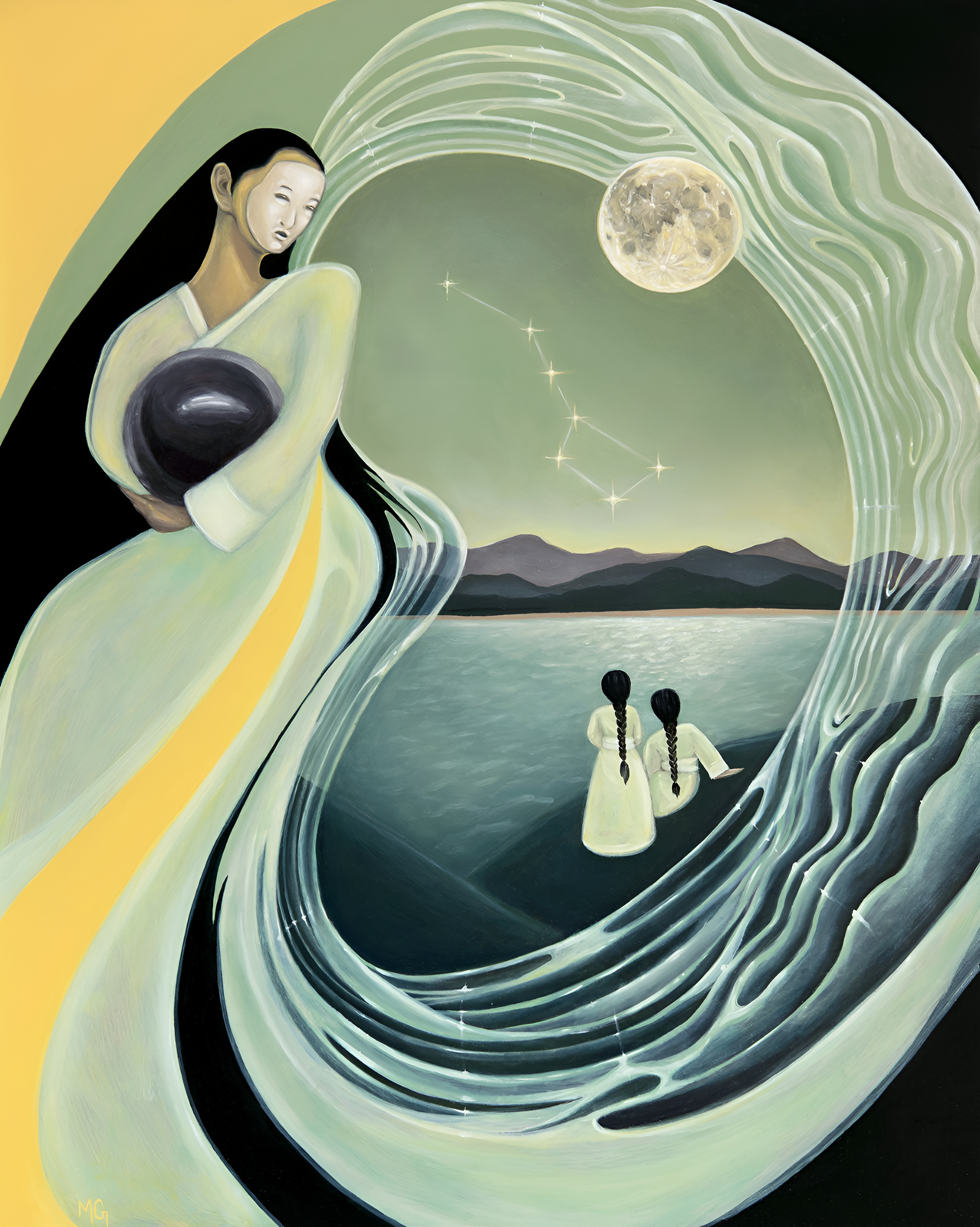Re-enchanting the world
Budo Medicine by Meesha Goldberg '08.
Mago Creates the World by Meesha Goldberg '08.
By Meesha Goldberg ’08
How does one deepen kinship with the land despite dislocation from one’s ancestral home and culture? This is the central question of my interdisciplinary body of work, which inquires into a land ethic of the Korean Diaspora, seeking resonance between ancestral culture and life on American soil. At the root of the artwork I seek to offer a critique of the American empire, the violence enacted on Indigenous people of Turtle Island, and the disruption of the indigeneity of the Korean Diaspora through war and neocolonial dominance. While America cannot become a motherland for the settler, and belonging to one’s ancestral homeland may be forever severed, one’s body remains the sacred site from where to honor kinship to the sources of life.
The Daughterland paintings depict these bodies in traditional dress overflowing with seasonal life: summer’s seed, fall’s root, winter’s rest. The series expresses ancestral grief as the faceless women wield the blades of the shaman, the fieldwoman’s sickle, antlers of the buck, and yet they tenderly carry life, embodying complete engagement with the flow of nature. The cover painting, From the Mountaintop, an illustration in the English translation of the myth “Budoji,” depicts an ancient ceremony on a mountaintop altar I witnessed during my first trip to Korea in 2022. By reaching back through the root of lineage, perhaps a vision for the future may be retrieved. Despite displacement from a motherland, the desecration of wild and sacred places, and the forgetting of names and songs, the persistent earth still offers itself through the generations.
Foraging Dress by Meesha Goldberg '08.
Seed by Meesha Goldberg '08.
Motivation
We imagined our relatives
still put us anonymously into prayers
on lunar new year, but there was
no telling. There was no telling
if our ancestors would descend
eighteen hours
just to reach us speaking English
In the fiction of a new world
we fragmented our longing
but as we are mountainless
in that wound
imagination festered
Nothing suggested such
but we imagined ourselves
remembered
& that myth’s sore legs
could walk us
Our American cloud mountain, Septembered
& berried
We imagined how grandmothers could guide us
the blindfolded
though we did not offer a single persimmon
though wild tigers stalked us out of our dreams
though we ripped out every root with great carelessness
our longing is holy
because we did not abandon it
All ginseng gatherers 심마니 feel the same
if they don’t find any for a couple days
They feel the urge to give up
That’s when the mountain spirit gives you one
That’s what motivates us to keep going
Meesha Goldberg is a Korean American poet and artist living in Charlottesville, VA. She graduated from College of the Atlantic in 2008. Her experiences growing food, serving as an activist, and journeying to sacred places have made her a powerful advocate for the Earth. Goldberg has exhibited her work in solo shows around the country, with her debut poetry chapbook, The Seed is Waiting in the Dark, forthcoming in 2024 from Finishing Line Press. Her art crosses the boundaries of genre to both experience and express transformational repair. Performance, ritual, painting, film, costume, and poetry merge in durational, place-based works and gallery installations that insist upon the re-enchantment of the world.





